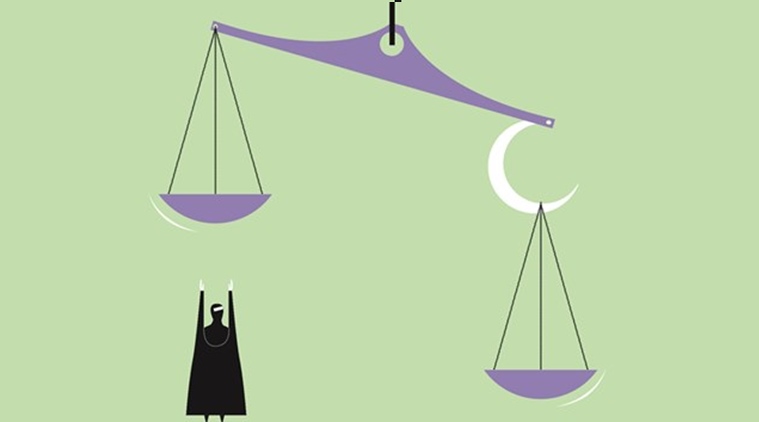Sharia courts in fact
Research has shown that sharia councils are approached voluntarily and are often progressive

Sharia courts in Mumbai follow a procedure that is standardised, informal, inexpensive and, above all, consensual. (Illustration: C R Sasikumar)
Monica Arora has written an emotive response to my article (‘Justice more accessible’, IE, July 16) titled, ‘A parallel injustice system’ (IE, July 27). Javed Anand, a veteran of several battles of civil liberties too has responded with ‘Courts of injustice’ (IE, 30 July). As an academic, I do not have the luxury of ideological leanings. I am duty bound to rely on hard research rather than popular stereotypes or opinions.
Neither Arora nor Anand has challenged the findings of my research and that of Mahendra Shukla, Sylvia Vatuk, Anindita Chakrabarty and Bittu Rani. It seems none of them has read Gopika Solanki of Carleton University who had undertaken a remarkable study in Mumbai. Her primary finding is that it is a faulty presumption that only Muslims use sharia courts as an adjudicatory mechanism. Her detailed ethnography of adjudication shows that different kinds of adjudicatory bodies including sharia courts, caste councils, sect councils, civil society organisations etc, do adjudicate in family disputes. Sharia courts are the norm and not an exception.
Solanki suggests that the rate of litigation in family courts is quite low and cases across religious groups are resolved in private forums. For instance, between 1991-2001, the crude divorce rate in the Mumbai family court remained 0.0001 (number of cases per thousand).
Arora and Anand would be shocked to know that Solanki found that sharia courts in Mumbai follow a procedure that is standardised, informal, inexpensive and, above all, consensual. She also found that during appeal, many litigants did approach state courts without any adverse effects or societal pressure. Even the February 2018 UK report to which Anand has referred found that almost all applicants in some 80 sharia courts were women. The report did not recommend a ban on the sharia courts. It, in fact, noted that Jews and Roman Catholics too have a similar system. Last week, the UK High Court has given legal recognition to Muslim nikah.
Anand, in particular, will be surprised to know that Solanki has documented cases in which sharia courts played a proactive role in helping women recover their dowry, persuading husbands to hand over proof of divorce, helping women who wished to obtain a divorce and even in challenging triple talaq if granted under wrongful conditions and helping the couple reconcile if they so desired.
In fact, Solanki’s research is unique as she found that sharia courts have harmonised religious and state laws. For instance, sharia courts freely granted khula and the grounds for divorce that they followed were quite similar to the grounds for divorce under the Dissolution of Muslim Women’s Act, 1939. If anything, these grounds followed by sharia courts were far more extensive, liberal and pro-women. She has found how these forums combine principles of Islamic jurisprudence and progressive state laws and judgments to provide justice to women. Jeffrey A. Reddying’s research also proves that the personal law board run sharia court in Delhi does follow processes similar to state courts.
Anand is under a wrong impression that all state laws and judgments are gender just and all religious laws are discriminatory. Even today, in a number of states, daughters get no share of agricultural property in the presence of sons. A Hindu wife is still not a coparcener. Did not the Supreme Court in V Valusami (2010) call the second Hindu wife a “mistress” and “keep”? Did not the Madras High Court hold that “divorcees too should maintain sexual purity to claim alimony”?
Arora’s claim of my article being “false” is laughable. She overlooked this crucial line of the Vishnu Lochan Madan judgment (2014): “But this does not mean that existence of Dar-ul-Qaza or for that matter the practice of issuing fatwas are themselves illegal.” She has also contested my claim of sharia courts as an “informal justice system”. This is what the Supreme Court had said about the sharia courts: “It is an informal justice delivery system with an objective of bringing about amicable settlement between the parties. It is within the discretion of the persons concerned either to accept, ignore or reject it.” She should understand that Vishnu Lochan had sought a ban on sharia courts and fatwa and sought an order from the court to hold them unconstitutional. But the court neither accepted his prayer nor issued any direction to the government to ban either the fatwa or sharia courts. There is a distinction between public law and private law. Thus, if parties wish to go to the sharia court, no one can force them to use civil courts. Of course, in criminal cases such an option is not available. If there is rape by a father in law, no fatwa has any meaning. Arora is not aware that in this very case not only did the couple ignore the absurd fatwa but on the victim’s testimony, the accused was convicted and is in jail.
Both Arora and Javed overlooked my central argument — the civil justice system is dying in India. CJI T S Thakur admitted in the Supreme Court Report of 2016 that “access to justice is illusionary”. As against 20,558 sanctioned posts, today we have just 15,540 judges. India has an extremely poor judge-population ratio. Unlike the US, which has 107 judges for 1 million people, we have barely 10 judges for the same number.
Arora is also wrong on nomenclature. I said clearly in my article that “sharia courts are not courts in the strict sense of the term but counselling or arbitration centres”. Arora has enhanced the stature of sharia courts by calling them a parallel justice system. Muslim women go to sharia councils because of the failure of our justice system.
The writer is vice-chancellor, NALSAR University of Law, Hyderabad. Views are personal
For all the latest Opinion News, download Indian Express App
More From Faizan Mustafa
- Justice more accessibleSharia courts are an alternative dispute redressal mechanism that responds to the decline of the civil justice system, and addresses the needs of the poor...
- Delhi power tussle: Between the Supreme Court’s linesSupreme Court verdict on Delhi CM vs L-G sends powerful message of pushback by institutions...
- Two inequalitiesUttar Pradesh CM Yogi Adityanath's talk of Dalit reservations in Jamia, AMU, misunderstands nature of minority institutions..








































No hay comentarios:
Publicar un comentario